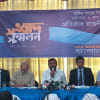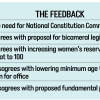Checks and balances are key to the success of reforms

With over 15 political parties submitting written feedback on state reform proposals so far, the second phase of the reform drive can be said to be reaching a definitive point. Some of the parties have been vocal about various aspects of the drive in recent months, but this marks their first official response, which in time will be used as a basis for agreement on implementable reforms by the National Consensus Commission. Among the parties, BNP and the National Citizen Party (NCP) submitted their feedback on Sunday, while Bangladesh Jamaat-e-Islami submitted theirs on Thursday—with their appraisals initially covering 166 key proposals by five reform commissions. We value their respective stances which we hope will leave room for compromise so that the desired consensus can be reached.
That said, certain aspects of these political appraisals, especially those relating to constitutional amendments and electoral system, deserve scrutiny given their potential impact. In particular, a preliminary reading of BNP's feedback shows that while the party leaves the door open for some radical changes—including a bicameral legislature with a 400-seat lower house and a 105-seat upper house—it appears less accommodating of other changes that may institute better checks and balances or limit exploitation of power using parliamentary majority. For instance, BNP does not deem it necessary to form a National Constitutional Council to handle appointments to the Anti-Corruption Commission and Election Commission. It also rejects the idea of holding the EC accountable to a parliamentary standing committee. Regarding the prime minister's tenure, it does not support the proposal that an individual cannot be PM more than twice, seemingly contradicting its own stance in its 31-point charter. It also disagrees with the proposal that one cannot be PM, leader of house, and chief of a political party at the same time. "Imposing constitutional restrictions on political parties is contrary to the core essence of parliamentary democracy," it says.
The message we get from these positions is that BNP remains hesitant to embrace institutional mechanisms that would prevent the excessive centralisation of power. But a key lesson from the history of past elected governments is that no party can be entrusted with absolute parliamentary authority, which, if unchecked, can lead to parliamentary dictatorship. Any reluctance to subject constitutional bodies to stronger oversight or to limit the authority of those in power is thus concerning.
The message we get from these positions is that BNP remains hesitant to embrace institutional mechanisms that would prevent the excessive centralisation of power. But a key lesson from the history of past elected governments is that no party can be entrusted with absolute parliamentary authority, which, if unchecked, can lead to parliamentary dictatorship. Any reluctance to subject constitutional bodies to stronger oversight or to limit the authority of those in power is thus concerning. While BNP supports certain aspects of constitutional reform, its insistence that these matters be decided by elected MPs again reflects a preference for parliamentary majoritarianism. It may be good in theory, but not so in practical experience.
We think a key question moving forward is whether political parties can rise above their immediate strategic calculations and prioritise long-term national stability. Faith in parliamentary democracy is not granted automatically; it is earned through responsible governance. The overwhelming public support for structural changes after the fall of Sheikh Hasina's government is a testament to their demand for a more accountable system. Politicians must not squander this opportunity.


 For all latest news, follow The Daily Star's Google News channel.
For all latest news, follow The Daily Star's Google News channel. 









Comments